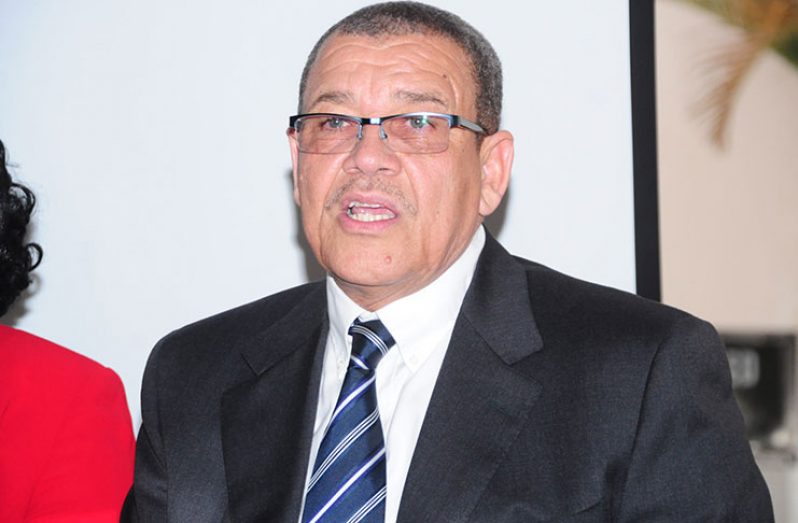…GRA wanted assessment to be critical
THE recent tax administration diagnostic report conducted by the International Monetary Fund (IMF) was sanctioned by the Guyana Revenue Authority (GRA), said Commissioner-General Godfrey Statia.
Statia told reporters Thursday that the assessment was done by the IMF to assist Guyana in making pivotal changes in the way things are done at the authority. He explained that it is not the first time such an assessment was done, and noted that the report is quite beneficial to the entity.
“We requested that the report be done and the reason for the request is to find out where we are and what the ills of the system are,” he stated. The commissioner-general said too that he wanted the IMF to be “critical” and not “gloss it over,” so that corrective measures can be put in place in this regard. “I told them I want them to be as critical as they should be; we don’t want them to gloss it over. We want the facts and they came and they did exactly that and that is the reason why I don’t have a problem with the report,” said Statia.
In its May 2017 report, the IMF highlighted the revenue authority’s strengths and weaknesses. Among the strengths identified were the qualified staff, oversight mechanisms and easily accessible information for taxpayers. However, the IMF found that there were functional limitations of the entity’s IT system, limited electronic transactions, weak filing and payment compliance among others.
The GRA head said the IMF informed the authority of the glitches, which were already known and made recommendations on what needed to be done to fix them. In the meantime, Statia said PricewaterhouseCoopers (PWC) had done a diagnostic report in 2007 and that report had highlighted the same weaknesses in the system. Recommendations were also made then, but to no avail.
“Those weaknesses were not fixed, so I asked PWC to do a follow-up report and fortunately, I had known one of the partners…it was upgraded and all [that had] to be done was to pay for the passages [airfares] for the persons. It was done free.
” That entity did a follow-up visit and according to Statia, was amazed that 80 per cent implementation of the recommendations has occurred. “I am not adverse to the report, all I could say— when you see the new report, you’ll see what we have started and are doing,” the commissioner-general stated, while noting that half of the issues emanated from the authority’s information technology (IT) systems which were unable to provide data.
“We changed the structure of the revenue authority that we wanted to implement rather than implement the IT system then change the structure, so persons were waiting for reports that IT should have been giving them and they didn’t have it. That is one of the reasons for the breakdown in training and those things,” he told reporters.
As a result, there were many hindrances, Statia said. Those included the inability to do risk assessments, post-clearance analysis and inventory evaluation to name a few. It is because of these deficiencies that the entity is moving from the Total Revenue Integrated Processing System (TRIPS) system to Automated Systems for Customs Data (ASYCUDA). “If you don’t have an IT system that is robust enough you will always have that problem,” Statia added, while noting that “we have to fix the IT system.”
The IMF had reported last year that Guyana uses TRIPS, a tax and customs application that does not seem to fit the purpose of integrated tax and customs operations.
“What we have done, we have moved to ASYCUDA. When completed, we would have what is called a single-window system. The single-window system would allow you as the taxpayer to do business across the board with all the government departments when we are finished.” That system will cost GRA some US$2.8M.
The authority had already spent over US$4M on the TRIPS system. “We stopped paying them in July 2016; TRIPS is now turning up slowly, so we are going to have some turn up of the TRIPS 2 system sometime in February or March. TRIPS 2 is just patch work…we need to get a robust IT system in place… so we will work along with TRIPS 2 until we get a robust one in place,” Statia said.
Discussions have already begun with experts on the subject. In fact, the authority has already met with experts from New Zealand who have installed same in The Bahamas, Barbados and Papua New Guinea to name a few countries. “These are some of the things we are looking at, because IT systems come at a cost.
It is a lot of things we have to do to decide what we are going to do. The TRIPS 2 will help us along; we are going to roll along slowly until we get proper IT systems in place. I trust that we will get it in place before 2020.” With a proper database, the GRA head said the entity would be able to see everybody’s information at the touch of a button.
“We’d be able to do all of the risk analysis and be able to tell you who owns every single building and lot in Georgetown, because they have a common taxpayer ID number. But without IT, we have to do it manually and that is what takes time.” He anticipates that the process will take approximately three more years to be completed.












